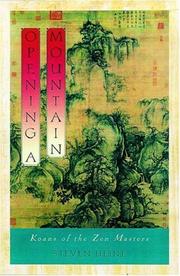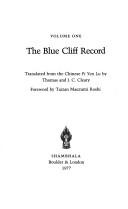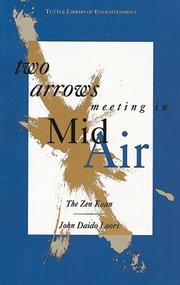| Listing 1 - 10 of 42 | << page >> |
Sort by
|

ISBN: 0195135865 Year: 2002 Publisher: Oxford : Oxford university press,
Abstract | Keywords | Export | Availability | Bookmark
 Loading...
Loading...Choose an application
- Reference Manager
- EndNote
- RefWorks (Direct export to RefWorks)
Book
ISBN: 0962561886 Year: 1998 Publisher: Berkeley (Calif.) : Numata Center for Buddhist Translation and Research,
Abstract | Keywords | Export | Availability | Bookmark
 Loading...
Loading...Choose an application
- Reference Manager
- EndNote
- RefWorks (Direct export to RefWorks)
Book
Abstract | Keywords | Export | Availability | Bookmark
 Loading...
Loading...Choose an application
- Reference Manager
- EndNote
- RefWorks (Direct export to RefWorks)
Book
Year: 1965 Publisher: Kyoto, : First Zen Institute of America in Japan,
Abstract | Keywords | Export | Availability | Bookmark
 Loading...
Loading...Choose an application
- Reference Manager
- EndNote
- RefWorks (Direct export to RefWorks)

ISBN: 0877730946 087773111X Year: 1977 Publisher: Boulder Shambhala
Abstract | Keywords | Export | Availability | Bookmark
 Loading...
Loading...Choose an application
- Reference Manager
- EndNote
- RefWorks (Direct export to RefWorks)
Book
ISBN: 3786705097 Year: 1975 Publisher: Mainz : Grünewald
Abstract | Keywords | Export | Availability | Bookmark
 Loading...
Loading...Choose an application
- Reference Manager
- EndNote
- RefWorks (Direct export to RefWorks)
Book
ISBN: 1948626098 9781948626095 9781948626088 Year: 2020 Publisher: Rhinebeck, New York
Abstract | Keywords | Export | Availability | Bookmark
 Loading...
Loading...Choose an application
- Reference Manager
- EndNote
- RefWorks (Direct export to RefWorks)
"Zen koans, beginning some 1500 years ago, refer to stories or questions arising in encounters between monks and old Chinese and Japanese masters, and include commentaries designed to help the Zen practitioner awaken. Koans like Hakuin's What is the sound of one hand clapping? are well-known, and the word koan has even gone mainstream. Thousands of classic koans emerged from the lives of monks living inside a Chinese or Japanese culture, and the commentaries on those koans contain poetic elements and images that have proved challenging for many Westerners. The Book of Householder Koans is a collection of koans created by 21st century Zen practitioners living a lay life in the West. The koans deal with the challenges of relationships, raising children, work, money, love, loss, old age, and death, and come from practitioners across three continents, and with commentaries by two Western teachers. The collection is based on the premise that our lives as householders contain situations rich with challenge and grit, the equivalents of old Zen masters' shouts or blows meant to sweep the ground right from under their students. They become koans, or koan practice, when they jolt us out of our usual way of thinking, when we're no longer observers of our lives but plunge in, closing the gap between ourselves and the situation we face"--
Book
ISBN: 2213006180 9782213006185 Year: 1978 Publisher: Paris : Fayard,
Abstract | Keywords | Export | Availability | Bookmark
 Loading...
Loading...Choose an application
- Reference Manager
- EndNote
- RefWorks (Direct export to RefWorks)
Koan --- Kôan. --- Zen Buddhism.

ISBN: 0804830126 9780804830126 Year: 1994 Publisher: Boston : Tuttle,
Abstract | Keywords | Export | Availability | Bookmark
 Loading...
Loading...Choose an application
- Reference Manager
- EndNote
- RefWorks (Direct export to RefWorks)
Through a comprehensive introduction and twenty-one chapters centered on koans from classic collections, western literary sources, and modern encounters, this book explains the relevance of koan study to Zen training today. It illuminates the value of koans in the practice of self-realization and their aliveness within the teacher-student relationship. Most importantly, the uniqueness of the koan as a means of studying the self is clearly shown in the context of the Buddhadarma--not as an archaic curiosity, but as a vibrant opportunity to fully appreciate this life.--
Book
ISBN: 9780824839734 0824839730 9780824839741 0824839749 Year: 2014 Publisher: Honolulu (Hawaii) : University of Hawaii press,
Abstract | Keywords | Export | Availability | Bookmark
 Loading...
Loading...Choose an application
- Reference Manager
- EndNote
- RefWorks (Direct export to RefWorks)
"What is the sound of one hand clapping?" "Does a dog have Buddha-nature?" These cryptic expressions are among the best-known examples of koans, the confusing, often contradictory sayings that form the centerpiece of Zen Buddhist learning and training. Viewed as an ideal method for attaining and transmitting an unimpeded experience of enlightenment, koans became the main object of study in Zen meditation, where their contemplation was meant to exhaust the capacity of the rational mind and the expressiveness of speech. Koan compilation, which include elegant poetic and eloquent prose commentaries on cryptic dialogues, are part of a great literary tradition in China, Japan, and Korea that appealed to intellectuals who sought spiritual fulfillment through interpreting elaborate rhetoric related to mysterious metaphysical exchanges. In this compact volume, Steven Heine, who has written extensively on Zen Buddhism and koans, introduces and analyzes the classic backgrounds of texts and rites and explores the contemporary significance of koans to illuminate the full implications of this ongoing tradition. He delves deeply into the inner structure of koan literature to uncover and interpret profound levels of metaphorical significance. At the same time, he takes the reader beyond the veil of vagueness and inscrutability to an understanding of how koan writings have been used in premodern East Asia and are coming to be evoked and implemented in modern American practice of Zen. By focusing on two main facets of the religious themes expressed in koan records - individual religious attainment and the role dialouges play in maintaining order in the monastic system - Zen Koans reveals the distinct yet interlocking levels of meaning reflected in different koan case records and helps make sense of the seemingly nonsensical. It is a book for anyone interested in untangling the web of words used in Zen exchanges and exploring their important place in the vast creative wellspring of East Asian religion and culture. -- from back cover.
| Listing 1 - 10 of 42 | << page >> |
Sort by
|

 Search
Search Feedback
Feedback About UniCat
About UniCat  Help
Help News
News